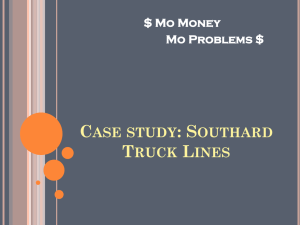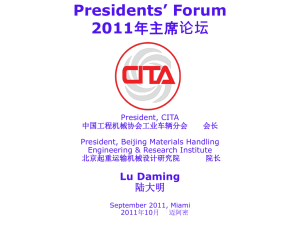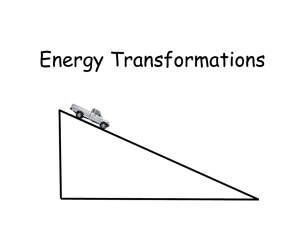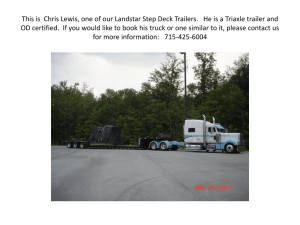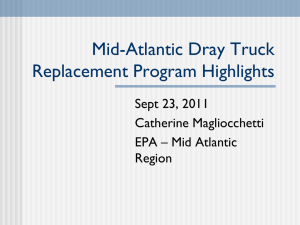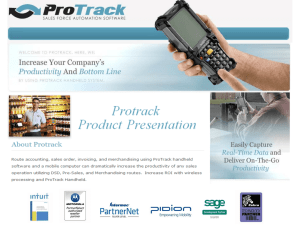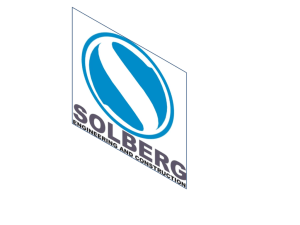Clean Trucks Fact Sheet
advertisement
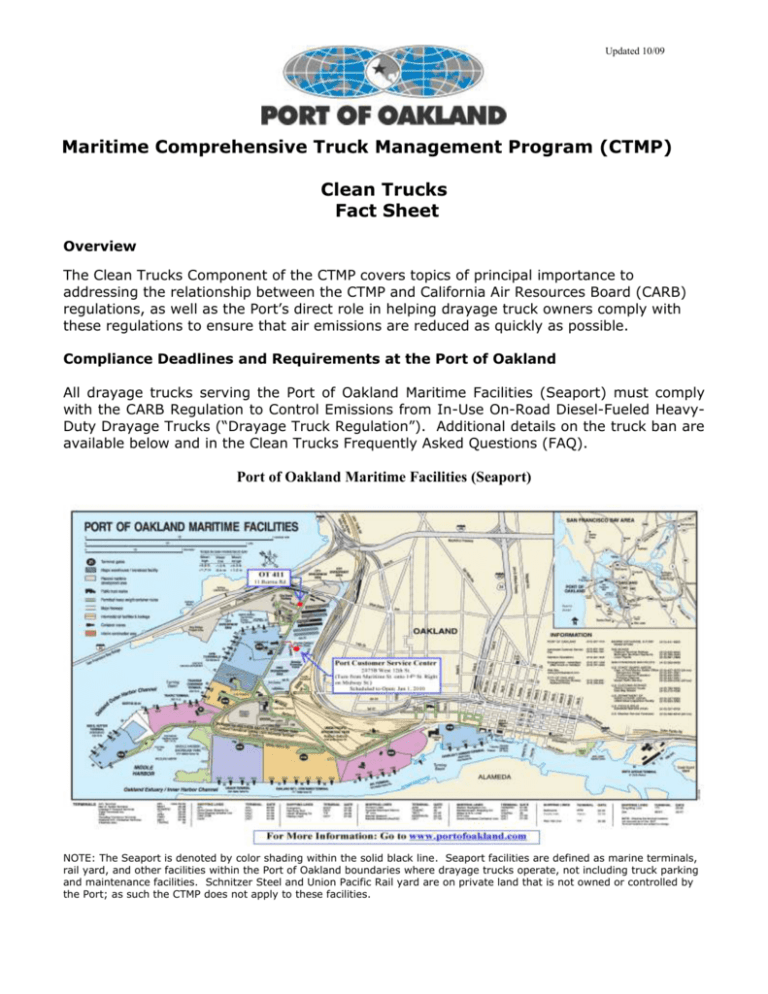
Updated 10/09 Maritime Comprehensive Truck Management Program (CTMP) Clean Trucks Fact Sheet Overview The Clean Trucks Component of the CTMP covers topics of principal importance to addressing the relationship between the CTMP and California Air Resources Board (CARB) regulations, as well as the Port’s direct role in helping drayage truck owners comply with these regulations to ensure that air emissions are reduced as quickly as possible. Compliance Deadlines and Requirements at the Port of Oakland All drayage trucks serving the Port of Oakland Maritime Facilities (Seaport) must comply with the CARB Regulation to Control Emissions from In-Use On-Road Diesel-Fueled HeavyDuty Drayage Trucks (“Drayage Truck Regulation”). Additional details on the truck ban are available below and in the Clean Trucks Frequently Asked Questions (FAQ). Port of Oakland Maritime Facilities (Seaport) NOTE: The Seaport is denoted by color shading within the solid black line. Seaport facilities are defined as marine terminals, rail yard, and other facilities within the Port of Oakland boundaries where drayage trucks operate, not including truck parking and maintenance facilities. Schnitzer Steel and Union Pacific Rail yard are on private land that is not owned or controlled by the Port; as such the CTMP does not apply to these facilities. Updated 10/09 The table below summarizes the requirements of CARB and the Port. Truck Engine Model Year CARB Emission Requirement Schedule Port of Oakland Emission Requirement Schedule 1993 and older Prohibited starting January 1, 2010 Prohibited starting January 1, 2010 Starting January 1, 2010, Reduce PM emissions by 85% (e.g. install a CARBverified level 3 Diesel Particulate Filter) Starting January 1, 2010, Reduce PM emissions by 85% (e.g. install a CARBverified level 3 Diesel Particulate Filter) And And Starting January 1, 2014, meet 2007 engine emission standards Starting January 1, 2014, meet 2007 engine emission standards Starting January 1, 2012, Reduce PM emissions by 85% (e.g. install a CARBverified level 3 Diesel Particulate Filter) Starting January 1, 2012, Reduce PM emissions by 85% (e.g. install a CARBverified level 3 Diesel Particulate Filter) And And Starting January 1, 2014, meet 2007 engine emission standards Starting January 1, 2014, meet 2007 engine emission standards Starting January 1, 2013, Reduce PM emissions by 85% (e.g. install a CARBverified level 3 Diesel Particulate Filter) Starting January 1, 2013, Reduce PM emissions by 85% (e.g. install a CARBverified level 3 Diesel Particulate Filter) And And Starting January 1, 2014, meet 2007 engine emission standards Starting January 1, 2014, meet 2007 engine emission standards Fully Compliant Fully Compliant 1994 1995 1996 1997 1998 1999 2000 2001 2002 2003 2004 2005 2006 2007 and newer* *Additional requirements may apply in 2021 for all drayage trucks pursuant the CARB Regulation to Reduce Emissions of Diesel Particulate Matter and Other Pollutants From In-Use Heavy-Duty Diesel-Fueled Vehicles (“Statewide Truck and Bus Regulation”). Updated 10/09 Roles and Responsibilities The Port requires that regulated entities fulfill all their obligations pursuant to the CARB regulations. The Port will work with its tenants to help ensure that all necessary reporting occurs, and to fulfill its reporting obligations to CARB. A summary of obligations and responsibilities under the CARB Drayage Truck Regulation is presented in the table below. Updated 10/09 Truck Ban at the Port of Oakland Seaport In October 2009, the Oakland Board of Port Commissioners approved a truck ban that is consistent with the January 2010 CARB deadline for drayage trucks. The ban requires that Seaport facility operators deny entry to drayage trucks that cannot demonstrate compliance with the CARB January 2010 emissions requirements listed in the table above. All non-compliant drayage trucks would be denied entry unless exempted by CARB, granted a waiver by CARB, or granted an extension by CARB. At the discretion of the Seaport facility operator, non-compliant trucks carrying cargo that is overweight or over-dimension may be allowed access into the facility. However, the facility operator must collect information on the truck, driver, dispatching motor carrier, and transaction prior to allowing access. The collected information will be submitted to CARB for enforcement action against the truck owner and dispatching motor carrier. From January 1, 2010 to December 31, 2010, any truck driver with non-compliant drayage truck that is denied access to a Seaport facility may go to the Port’s Customer Service Center (CSC) on Monday-Friday between 7:30am-4:00pm to request a one-time Temporary Non-Compliance Pass. The location of the CSC is identified in the map above. After submitting information regarding the truck, driver, dispatching motor carrier, and transaction, the CSC may issue a one-time Temporary Non-Compliance Pass to the truck operator allowing the truck access to the facility. No more than one Pass for any one truck will be issued. Additionally, the collected information will be submitted to CARB for enforcement action against the truck owner and dispatching motor carrier. Temporary Non-Compliance Passes will not be issued beyond December 31, 2010. Financial Resources Available for Truck Retrofits and Replacements Together, the Port, Bay Area Air Quality Management District (BAAQMD), CARB, and Environmental Protection Agency (EPA) are providing $22 million in grants for truck retrofit and replacement to assist truck owners to meet the January 1, 2010 CARB deadline. Additionally, the Port has partnered with One California Bank to make available loans and financial assistance to help truck owners upgrade their equipment. Truck owners are encouraged to stop by the Grants Information Center at OT-411, located at 11 Burma Road (off Maritime Avenue) adjacent to the Seaport, for more information. For More Information www.portofoakland.com Environmental Regulations and Port requirements: Tim Leong, Port Environmental Scientist Phone: 510-627-1537 Email: tleong@portoakland.com Updated 10/09 Community Outreach: Laura Arreola, Port Field Representative. Phone: 510-627-1135 Email: larreola@portoakland.com One California Bank: Russell Haycock, Chief Credit Officer Phone: (510) 550-8403. www.onecalif.com
